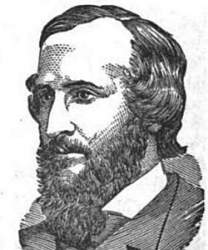Record Data
Source citation
"Comments of the New York Press on the President's Veto Message," Chicago Tribune, February 23, 1866, p. 2.
Original source
The New York World, February 20, 1866
Type
Newspaper
Date Certainty
Exact
Transcriber
John Osborne, Dickinson College
Transcription date
Transcription
The following text is presented here in complete form, as it originally appeared in print. Spelling and typographical errors have been preserved as in the original.
President Johnson has nobly sustained his character for steadiness of purpose and political courage, by the veto he sent to the Senate, yesterday, of the bill for enlarging the powers of the Freedmen's Bureau. The veto message is a document of such grave consequence that it will be attentively read by all who take and interest in public affairs. It is due alike to the President, and the subject, that his reasoning should be carefully weighed in the language in which he has seen fit to present it.
The consideration of most immediate interest is the likelihood of the veto being effective. Can the bill be passed by two-thirds of both Houses over the veto, and become a law in spite of the President? We think it cannot; but the question is not so free from doubt as to set the public anxiety at rest until the trial has been made. It was originally passed, in each House, by a majority of nearly three fourths.
If all the Republicans in each House shall adhere to their original vote, the veto will be unavailing. But of this there is no probability. The bill having originated in the Senate, it must first be reconsidered in that body; and failing to get two-thirds there, it is dead without any action of the House. Supposing the same number of Senators to vote as on its first passage, fifteen will suffice to kill it; which requires a transfer of only five votes from the Republican to the Democratic side. Mr. Cowan and Mr. Nesmith did not vote on the original passage of the bill; but they will doubtless be in their places to sustain the veto. Mr. Doolittle and Mr. Dixon may be relied on with entire certainty to change their votes. Of the New York Senators, Mr. Harris may, and Mr. Morgan probably will, be found on the side of the President. Some of the other Republican Senators may find it convenient to be absent. We therefore consider it tolerably safe to conclude that the veto will be sustained, and that President Johnson will successfully thwart one of the most mischievous and dangerous measures that ever passed the two Houses.
Greater interest is felt in the efficiency of this particular veto from the fact that, if successful, it will form a turning point in the policy of the government. In any event, it will prove a decisive test of the power of the President to arrest unconstitutional legislation. The Republican Senators who broke lose from the trammels of party to support the veto, will have so committed themselves to the policy of the President, that they may be relied on to support him hereafter. If this veto is sustained, it is demonstrated that Congress is powerless to interfere unconstituionally with the rights of the States and deprive them of the control of their own affairs. It may continue to refuse seats to their representatives; but the Republican party will thereby gain no practical advantage, since it can give effect to none of its favorite measures.
The credit of composing an able state paper (though fame of this kind has its value) is trivial in comparison with the higher attributes of statesmanship exhibited by Mr. Johnson. His steadiness and power of will, his intrepidity, sagacity, and moderation, appear, on this occasion, to conspicuous advantage. He has had the courage to rise above party and vindicate the Constitution. Interpreting it as it has always heretofore been understood, he has shown that firm confidence in his own judgment which marks a mind of more than ordinary strength; and a staunch honesty of purpose which no clamor of an organized multitude can shake. The greatest act of Gen. Jackson's life was a veto; and President Johnson has shown and honest intrepidity that is truly Jacksonian, and will be equally sustained by the people, when they come to understand the true merits of the question.
Neither Jefferson nor Jackson, our two great Democratic Presidents, ever asserted with such fearless fidelity and ringing emphasis the fundamental principles of civil liberty as President Johnson has done in this message; for no occasions arose under their administrations calling for such vigorous defense of all that freemen hold dear. It is truly reviving, after what the country has gone through in the last five years, to see the habeus corpus, trial by jury, and other invaluable rights so boldly asserted by the President of the United States. Some fanatic of the Thad. Stevens stripe said, in the first year of the war, that the Constitution must be rolled up and laid away till after its close. President Johnson has taken it down and unrolled it; and what is more, he has the good faith to acknowledge that it means what it says.










